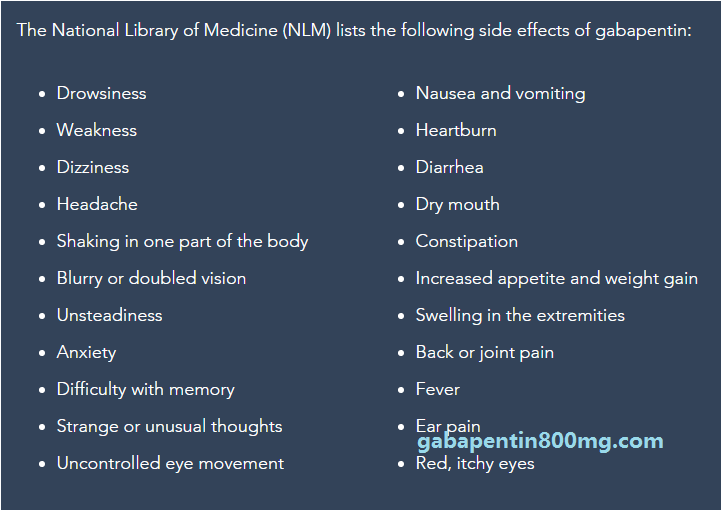
The most common side effects of NEURONTIN include:
- lack of coordination
- feeling tired
- viral infection
- fever
- feeling drowsy
- jerky movements
- nausea and vomiting
- difficulty with coordination
- difficulty with speaking
- double vision
- tremor
- unusual eye movement
- swelling, usually of legs and feet
SIDE EFFECTS: Drowsiness, dizziness, loss of coordination, tiredness, blurred/double vision, unusual eye movements, or shaking (tremor) may occur. If any of these effects persist or worsen, tell your doctor or pharmacist promptly.
Remember that your doctor has prescribed this medication because he or she has judged that the benefit to you is greater than the risk of side effects. Many people using this medication do not have serious side effects.
Tell your doctor right away if any of these unlikely but serious side effects occur: swelling of the hands/ankles/feet, signs of infection (such as fever, cough, persistent sore throat).
A small number of people who take anticonvulsants for any condition (such as seizures, bipolar disorder, pain) may experience depression, suicidal thoughts/attempts, or other mental/mood problems. Tell your doctor immediately if you or your family/caregiver notice any unusual/sudden changes in your mood, thoughts, or behavior including signs of depression, suicidal thoughts/attempts, thoughts about harming yourself.
Get medical help right away if you have any serious side effects, including: unusual fever, swollen glands, yellowing skin/eyes, unusual tiredness, dark urine, change in the amount of urine, chest pain.
A very serious allergic reaction to this drug is rare. However, get medical help right away if you notice any symptoms of a serious allergic reaction, including: rash, itching/swelling (especially of the face/tongue/throat), severe dizziness, trouble breathing.
This is not a complete list of possible side effects. If you notice other effects not listed above, contact your doctor or pharmacist.
Important Gabapentin warnings
- Drowsiness warning: Gabapentin can slow your thinking and motor skills and cause drowsiness and dizziness. It’s not known how long these effects last. You should not drive or use heavy machinery while taking this drug until you know how it affects you.
- Depression warning: Using this drug increases your risk of suicidal thoughts and behavior. Talk to your doctor if you feel depressed, or notice any changes in your mood or behavior. Also talk to your doctor if you are having thoughts of harming yourself, including suicide.
- Multiorgan hypersensitivity/DRESS warning: This medication can cause multiorgan hypersensitivity. This is also known as a drug reaction with eosinophilia and systemic symptoms (DRESS). This syndrome can be life-threatening. Call your doctor right away if you have symptoms such as a rash, a fever, or swollen lymph nodes.
Serious side effects
Call your doctor right away if you have serious side effects. Call 911 if your symptoms feel life-threatening or if you think you’re having a medical emergency. Serious side effects and their symptoms can include the following:
- Changes in mood or anxiety. Symptoms can include:
- thoughts of suicide or dying
- attempts to commit suicide
- anxiety that’s new or gets worse
- crankiness that’s new or gets worse
- restlessness
- panic attacks
- trouble sleeping
- anger
- aggressive or violent behavior
- extreme increase in activity and talking
- unusual changes in behavior or mood
- Changes in behavior and thinking, especially in children ages 3 to 12 years. Symptoms can include:
- emotional changes
- aggressiveness
- trouble concentrating
- restlessness
- changes in school performance
- hyper behavior
- Serious and life-threatening allergic reaction. Symptoms can include:
- skin rashes
- hives
- fever
- swollen glands that do not go away
- swollen lips and tongue
- yellowing of your skin or the whites of your eyes
- unusual bruising or bleeding
- severe tiredness or weakness
- unexpected muscle pain
- frequent infections